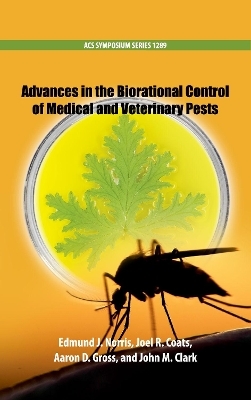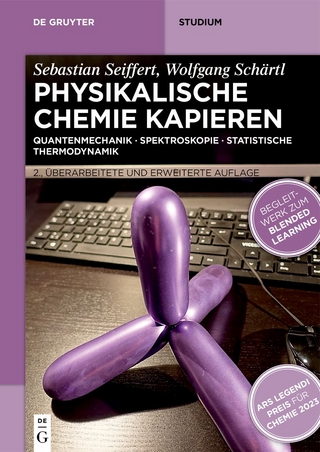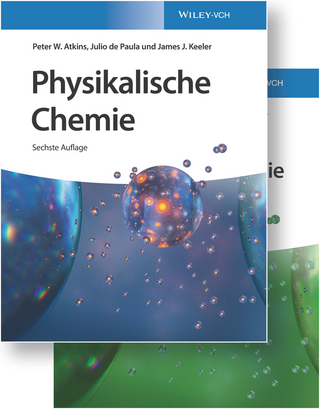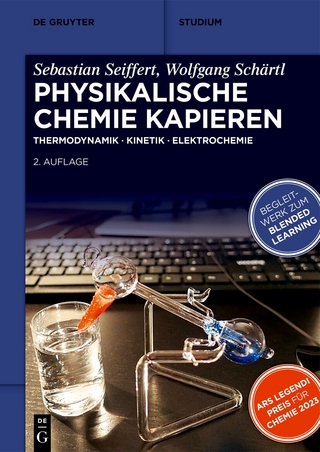
Advances in the Biorational Control of Medical and Veterinary Pests
Oxford University Press Inc (Verlag)
978-0-8412-3359-1 (ISBN)
Insect vectors pose a significant threat to public health and veterinary medicine throughout the world. It is estimated that more than 700,000 people die annually from complications associated with mosquito-borne disease alone, without accounting for the impact caused by other arthropod pests of public health importance. As these pest insect populations become increasingly resistant to classical synthetic insecticides, new chemistries and control approaches need to
be rapidly developed, characterized, and deployed. Biorational control methods are technologies derived from natural chemistry or exploit the physiology of the arthropod pest in question to limit potential harm to non-target organisms. As the global population grows and continues to encounter new and
old arthropod-borne diseases, it is paramount that future arthropod control technologies are safe and sustainable to our communities and the environment around us.
Edmund J. Norris, PhD, is Postdoctoral Research Associate in the Pesticide Toxicology Laboratory at Iowa State University. He received his PhD in both Entomology and Toxicology at Iowa State University under the supervision of Joel Coats, PhD, and Lyric Bartholomay, PhD. His research focuses on the development of new biorational pesticidal chemistries and technologies, with emphasis on the development of targeted strategies for the control of public health and veterinary pest arthropods. Joel R. Coats is Distinguished Professor of Entomology and Toxicology at Iowa State University. His insect toxicology research focuses on natural products as insecticides, insect repellents, and synergists. He has graduated 44 graduate students from his lab and currently has six PhD students. This is his 11th book published through ACS Books. Aaron D. Gross is Assistant Professor of Toxicology and Physiology at Virginia Polytechnic Institute and State University. He earned his doctoral degree from Iowa State University of Science and Technology under the supervision of Dr. Joel Coats and Dr. Michael Kimber. His postdoctoral research training was at the Emerging Pathogens Institute, University of Florida, under the supervision of Dr. Jeffrey Bloomquist. His research interest includes the discovery mechanisms of action of naturally occurring and synthetic pesticides with the goal of controlling arthropods that are important vectors of human and animal health. John M. Clark is Professor of Environmental Toxicology & Chemistry in the Department of Veterinary & Animal Science at the University of Massachusetts-Amherst and directs the Massachusetts Pesticide Analysis Laboratory for the Commonwealth of Massachusetts. Dr. Clark's research interests include pesticide modes of action (specializing on the pyrethroids), insecticide resistance mechanisms and management, and environmental fate and exposure assessment of pesticides. He is currently the Editor-in-Chief of the scientific journal Pesticide Biochemistry and Physiology.
Preface
Introduction
1. Putting the Rational into Biorational
Current and Future Outlooks for Medical and Veterinary Pest Control
2. Overcoming Insecticide Resistance: Proactive Detection and Management of Insecticide-Resistant Human Lice
3. Current Evidence, New Insights, Challenges and Future Outlooks to the Use of Spatial Repellents for Public Health
4. Present and Future Outlook: The Potential of Green Chemistry in Vector Control
5. Attractive Toxic Sugar Baits (ATSB): A Novel Vector Management Tool
6. Molecular and Nano-Scale Alternatives to Traditional Insecticides for in Situ Control of Mosquito Vectors
7. Getting Them Where They Live-Semiochemical-Based Strategies To Address Major Gaps in Vector Control Programs: Vectrax, SPLAT BAC, Trojan Cow, and SPLAT TK
8. G-Protein-Coupled Receptors: Their Expression, Function and Regulation in Insecticide Resistance
Characterizing Molecular Targets and Pest Biology for the Development of New Technologies
9. Insecticidal Activity and Physiological Actions of Matrine, a Plant Natural Product
10. Development and Evaluation of Push-Pull Control Strategies against Aedes aegypti (Diptera: Culicidae)
11. Monoterpenoid Isovalerate Esters as Long-Lasting Spatial Mosquito Repellents
12. Plant Terpenoids Modulate ?-Adrenergic Type 1 Octopamine Receptor (PaOA1) Isolated from the American Cockroach (Periplaneta americana)
13. Potential for Utilization of Spatial Repellents in Mosquito Control Interventions
14. Determination and Comparison of the Cuticular Thickness Across Several Insecticide Resistant and Susceptible Populations of the Common Bed Bug, Cimex lectularius L.
Editors' Biographies
Author Index
Subject Index
| Erscheinungsdatum | 17.01.2019 |
|---|---|
| Reihe/Serie | ACS Symposium Series |
| Verlagsort | New York |
| Sprache | englisch |
| Maße | 157 x 234 mm |
| Gewicht | 628 g |
| Themenwelt | Naturwissenschaften ► Chemie ► Physikalische Chemie |
| Weitere Fachgebiete ► Land- / Forstwirtschaft / Fischerei | |
| ISBN-10 | 0-8412-3359-4 / 0841233594 |
| ISBN-13 | 978-0-8412-3359-1 / 9780841233591 |
| Zustand | Neuware |
| Haben Sie eine Frage zum Produkt? |
aus dem Bereich


